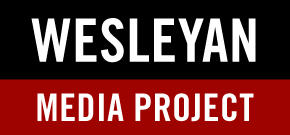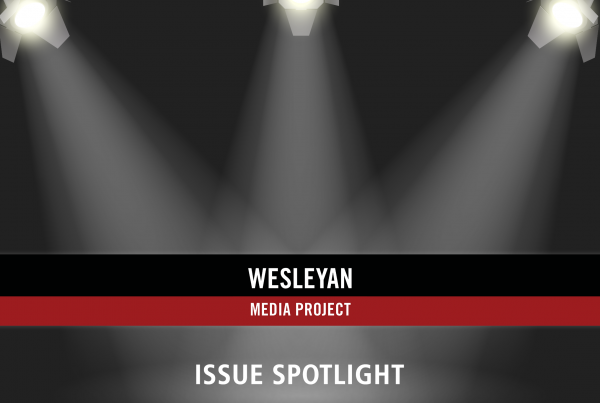10% of Dems Digital Ads Mention ACA and Republican Health Bills;
Robert Mueller a non-Issue
![]()
![]()
(MIDDLETOWN, CT) November 1, 2018 – The Wesleyan Media Project has previously reported on digital spending in federal races this cycle. In this report, we show the frequency of issue mentions in TV and Facebook ads for the general election nominees in the twelve most competitive Senate races.
Almost 35 percent of the Facebook ads placed by Republican Senate candidates in 12 competitive contests mention Donald Trump, compared to 17 percent of the ads placed by those same candidates on television. Table 1 shows the percentage of television ad airings by general election Senate candidates in those states between August 1 and September 30 that mention several political figures—along with the percentage of Facebook ads (weighted by the estimated number of impressions) that mention each of the political figures.
Charles Schumer, the Democratic leader in the Senate, is mentioned in 4.7 percent of ad airings on television but appears much less commonly in Facebook ads. Nancy Pelosi appears in 4.3 percent of television airings (some of them Democratic), and Hillary Clinton is mentioned in 1.5 percent of television airings (all of them Republican). The Republican leader in the Senate, Mitch McConnell, is mentioned in 2.6 percent of the Facebook ads but was not mentioned in a television ad.
Not a single Senate candidate mentioned Robert Mueller, the independent counsel, in television or Facebook advertising.
![]()
Table 1: Mentions of Political Figures in TV and Facebook (FB) Ads
| TV All | TV Dem | TV GOP | FB All | FB Dem | FB GOP |
|
|---|---|---|---|---|---|---|
| Trump | 12.8% | 9.9% | 16.9% | 16.9% | 12.1% | 34.3% |
| McConnell | 0.0% | 0.0% | 0.0% | 2.6% | 3.4% | 0.0% |
| Schumer | 4.7% | 0.0% | 11.3% | 0.7% | 0.0% | 3.4% |
| Pelosi | 4.3% | 2.3% | 7.1% | 0.7% | 0.2% | 2.5% |
| Obama | 2.8% | 0.0% | 6.7% | 0.4% | 0.0% | 1.6% |
| B Clinton | 0.0% | 0.0% | 0.0% | 0.3% | 0.4% | 0.0% |
| H Clinton | 1.5% | 0.0% | 3.7% | 0.1% | 0.0% | 0.3% |
| Mueller | 0.0% | 0.0% | 0.0% | 0.0% | 0.0% | 0.0% |
| Ryan | 0.0% | 0.0% | 0.1% | 0.0% | 0.0% | 0.0% |
| Bush | 0.0% | 0.0% | 0.0% | 0.0% | 0.0% | 0.0% |
| Reagan | 0.0% | 0.0% | 0.0% | 0.0% | 0.0% | 0.0% |
| Figures cover the August 1 to September 30, 2018, time period. Figures cover advertising sponsored by the Democratic and Republican nominees for Senate in Arizona, Florida, Indiana, Missouri, Montana, Nevada, North Dakota, Ohio, Pennsylvania, Tennessee, West Virginia and Wisconsin. Percentages are based on proportion of airings (for TV) and proportion of impressions (for Facebook). Estimates of Facebook impressions come from Pathmatics. |
||||||
Table 2 shows how often various issues are mentioned. The list is not a complete account of all the issues in these ads but shows how frequently selected issues are mentioned. Taxes are the most commonly mentioned issue on television (of the coded issues), appearing in 16.5 percent of ad airings. It is an issue mentioned frequently by both Democrats and Republicans. Immigration is the second most mentioned issue on television (again, of the listed issues in Table 1), appearing in 11.8 percent of airings overall (8.4 percent on the Democratic side and 16.5 percent on the Republican side). Domestic violence was mentioned in 3.8 percent of television ad airings.
In Facebook advertising, the top issues mentioned are the Affordable Care Act (also known as Obamacare) and Republican efforts to reform health care in 2017. Each appeared in about 8 percent of Facebook ads seen, largely in ads by Democratic sponsors. Immigration was mentioned in 5.8 percent of Facebook ads seen, but in 23.3 percent of those sponsored by Republicans. Democrats largely ignored the issue online.
Candidates have been relatively silent about Republicans’ 2017 tax reform legislation. Only 4.2 percent of television ad airings from Republicans mention the issue, and fewer than 1 percent of Democratic airings do. On Facebook, only Democrats mention the issue.
Candidates have said almost nothing on issues of police brutality, #metoo, the Parkland shooting, DACA and LGBT issues.
![]()
Table 2: Mentions of Selected Issues in TV and Facebook (FB) Ads
| TV All | TV Dem | TV GOP | FB All | FB Dem | FB GOP |
|
|---|---|---|---|---|---|---|
| ACA | 1.9% | 1.4% | 2.4% | 8.1% | 10.0% | 1.5% |
| GOP health reform | 3.5% | 5.6% | 0.7% | 8.0% | 10.2% | 0.2% |
| Immigration | 11.8% | 8.4% | 16.5% | 5.8% | 0.9% | 23.3% |
| Opioids | 3.4% | 5.6% | 0.3% | 1.1% | 1.5% | 0.0% |
| Taxes | 16.5% | 14.0% | 20.1% | 1.1% | 1.4% | 0.0% |
| Substance Abuse | 3.4% | 5.6% | 0.3% | 0.4% | 0.5% | 0.0% |
| Guns | 2.8% | 1.7% | 4.3% | 0.3% | 0.0% | 1.4% |
| Civil Rights | 0.0% | 0.0% | 0.0% | 0.3% | 0.4% | 0.0% |
| Gender Discrimination | 1.3% | 0.0% | 3.2% | 0.2% | 0.3% | 0.0% |
| 2017 Tax Reform Bill | 2.3% | 0.9% | 4.2% | 0.1% | 0.1% | 0.0% |
| DACA | 0.0% | 0.0% | 0.0% | 0.1% | 0.1% | 0.0% |
| LGBTQ issues | 0.0% | 0.0% | 0.0% | 0.0% | 0.0% | 0.0% |
| Domestic violence | 3.8% | 3.4% | 4.5% | 0.0% | 0.0% | 0.0% |
| Me Too | 0.0% | 0.0% | 0.0% | 0.0% | 0.0% | 0.0% |
| Parkland shooting | 0.0% | 0.0% | 0.0% | 0.0% | 0.0% | 0.0% |
| Police Brutality | 0.0% | 0.0% | 0.0% | 0.0% | 0.0% | 0.0% |
| Figures cover the August 1 to September 30, 2018, time period. Figures cover advertising sponsored by the Democratic and Republican nominees for Senate in Arizona, Florida, Indiana, Missouri, Montana, Nevada, North Dakota, Ohio, Pennsylvania, Tennessee, West Virginia and Wisconsin. Coding of Facebook and television ads was conducted by the Wesleyan Media Project. Percentages are based on proportion of airings (for TV) and proportion of impressions (for Facebook). Estimates of Facebook impressions come from Pathmatics. |
||||||
About This Report
Data reported here from Kantar Media/CMAG do not cover local cable buys, only broadcast television, national network and national cable buys. Spending on Facebook advertising comes from estimates generated by Pathmatics, a market intelligence firm. The company tracks paid advertising in the mobile Facebook newsfeeds of their opt-in panel, which consists of hundreds of thousands of users who reflect the diversity of active Facebook users.
The Wesleyan Media Project (WMP) provides real-time tracking and analysis of political advertising in an effort to increase transparency in elections. Housed in Wesleyan’s Quantitative Analysis Center – part of the Allbritton Center for the Study of Public Life – the Wesleyan Media Project is the successor to the Wisconsin Advertising Project, which disbanded in 2009. It is directed by Erika Franklin Fowler, associate professor of government at Wesleyan University, Michael M. Franz, professor of government at Bowdoin College and Travis N. Ridout, professor of political science at Washington State University. WMP staff include Laura Baum (Project Manager), Dolly Haddad (Project Coordinator) and Matthew Motta (Research Associate).
The Wesleyan Media Project is supported by Wesleyan University and the John S. and James L. Knight Foundation. Data are provided by Kantar Media/CMAG with analysis by the Wesleyan Media Project. WMP is partnering again this year with the Center for Responsive Politics, to provide added information on outside group disclosure.
Periodic releases of data will be posted on the project’s website and dispersed via Twitter @wesmediaproject. To be added to our email update list, click here.
For more information contact:
mediaproject@wesleyan.edu
About Wesleyan University
Wesleyan University, in Middletown, Conn., is known for the excellence of its academic and co-curricular programs. With more than 2,900 undergraduates and 200 graduate students, Wesleyan is dedicated to providing a liberal arts education characterized by boldness, rigor and practical idealism. For more, visit wesleyan.edu.
About the John S. and James L. Knight Foundation
Knight Foundation is a national foundation with strong local roots. We invest in journalism, in the arts, and in the success of cities where brothers John S. and James L. Knight once published newspapers. Our goal is to foster informed and engaged communities, which we believe are essential for a healthy democracy.




